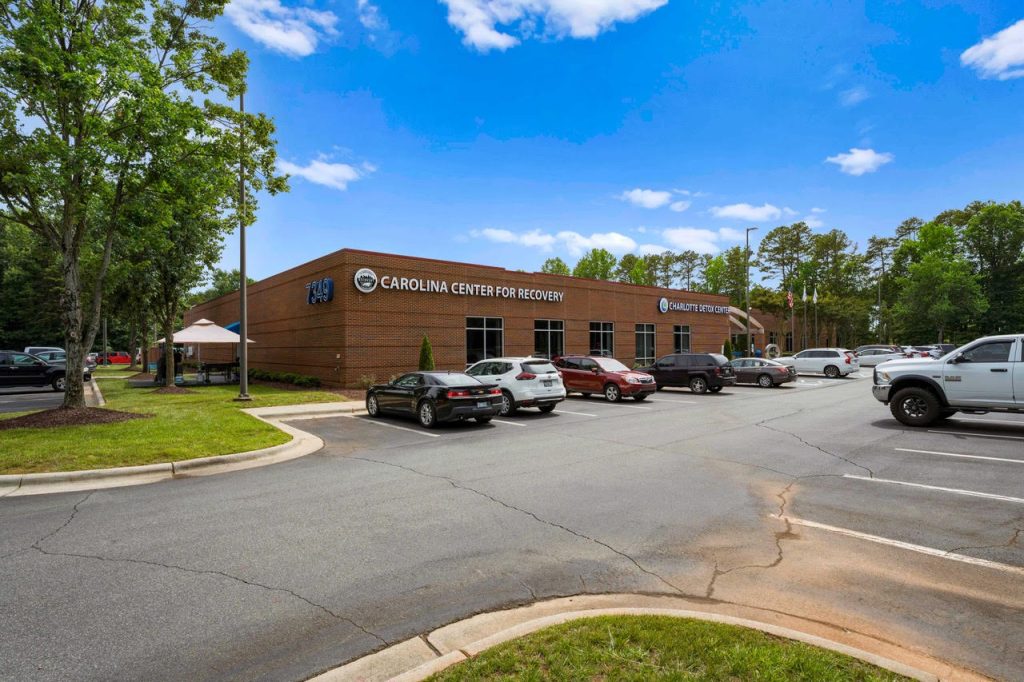Silver Ridge Recovery
Silver Ridge Recovery is a private residential treatment center in the Blue Ridge Mountains of North Carolina, designed for midlife adults seeking recovery from substance use and co-occurring disorders. The center provides an intimate, restorative environment focused on personalized care and holistic healing. Silver Ridge’s program emphasizes the unique challenges of adults in their 30s…
Carolina Center for Recovery
Carolina Center for Recovery is a family-owned drug and alcohol rehabilitation center in Charlotte, North Carolina, offering comprehensive addiction and mental health treatment. The center combines evidence-based clinical care with compassionate support in a serene, therapeutic environment. An In-House Full Continuum of Recovery Care The facility offers a full continuum of care, from detox to…
Why Trust ExecutiveRehabs
Since 2003, our expert team has built comprehensive resources on executive rehab centers that you can trust to find the right treatment for you.
Transparency and accuracy matter, and we believe you deserve nothing short of the best possible experience when reaching out for support.
FAQs on Executive Rehab
The Executive-Level Addiction Treatment Landscape in North Carolina
North Carolina is home to a broad swath of busy executive professionals across sectors such as banking and finance in Charlotte, technology and life sciences at Research Triangle Park, manufacturing and logistics in the Piedmont/Triad region, and healthcare management statewide.
These roles carry high-performance demands, tight schedules, frequent travel, and substantial visibility.
In such contexts, substance use or co-occurring mental health conditions can pose risks not only to individual well-being but to job performance, corporate reputations, and fiduciary responsibilities.
A treatment framework tailored for executives must therefore meet three interlocking needs: clinical depth, confidentiality, and continuity of professional responsibility.
Distinctive Features of Executive-Level Rehab in NC
Executive-focused rehab programs differ in key ways from standard residential treatment.
According to the Substance Abuse and Mental Health Services Administration (SAMHSA) and industry overviews, executive programs typically emphasise:
-
Enhanced privacy and discretion: private rooms, restricted visitor access, secure communications, and non-disclosure practices so that public exposure or corporate fallout is minimized.
-
Flexible scheduling and technology-friendly protocols: executives may need predictable availability, connectivity (WiFi, laptops), and private meeting spaces, even during treatment, to maintain mission-critical work functions.
-
Bespoke care and dual-diagnosis support: programs recognise the high prevalence of co-occurring mental health issues (stress, burnout, anxiety, depression) among executives, and integrate therapies accordingly (CBT, EMDR, mindfulness, wellness coaching).
-
Smaller client-to-staff ratios and luxury amenities: though not the clinical core, many executive programs provide higher staffing levels and upscale settings to reflect the intensity of the client’s role and the necessity of creating a low-disruption environment. In the North Carolina context, these features can translate into executive-program offerings at local facilities (or out-of-state options) that allow an executive to step away briefly, protect professional standing, and return to work with enhanced resilience.
North Carolina-Specific Challenges for Executives
While the local business environment strongly supports high-functioning professionals, several constraints address executive-level rehab in North Carolina:
-
Relative scarcity of explicitly labelled “executive” rehab programs within the state. Many treatment centers in North Carolina provide high-quality care, but fewer advertise dedicated executive tracks with executive-specific amenities (privacy, work-continuity, concierge services). This can lead local executives to seek specialised care out of state.
-
Regulatory and confidentiality considerations: In North Carolina, treatment facilities must comply with federal laws such as 42 CFR Part 2 (confidentiality of substance use disorder patient records) as well as state statutes such as G.S. 122C-52 (North Carolina Mental Health Confidentiality) and regulations under the North Carolina Department of Health and Human Services. Ensuring that an executive’s admission and treatment do not trigger professional licensing or board disclosure requires careful oversight.
-
Insurance and cost implications: Many executive features (private rooms, concierge services, flexible work-access) may fall outside standard insurance benefits or require self-pay. Executives must verify employer or personal policy coverage, understand what ancillary amenities cost, and explore the implications of using health insurance versus direct pay.
-
Work-force pressures and biting time constraints: Executives may feel that stepping away for extended residential care risks leadership gaps, corporate exposure, or significant business interruption. A program that offers partial stay, outpatient continuation, or tele-work accommodation is often more acceptable. The pressure to preserve confidentiality while engaging in meaningful recovery can make program selection more complex.
-
Stigma and career risk: The risk of reputational damage, board scrutiny, or regulatory exposure (in sectors like finance, healthcare, or public companies) may deter executives from seeking conventional publicly-known treatment settings. They may prefer remote or “destination” care to preserve anonymity.
Local Data and the Need for Executive Treatment
North Carolina’s behavioral-health landscape underscores the need for tailored executive care.
According to SAMHSA’s “Behavioral Health Barometer: North Carolina, Volume 6”, 49,520 clients were in substance abuse treatment across 552 facilities surveyed in March 2019. State data show drug overdose death rates rising from 13 per 100,000 in 2011 to 39.2 per 100,000 in 2021.
While these figures are statewide and not specific to executives, they affirm that substance use remains a serious issue in the state.
Regional breakdowns: for example, a SAMHSA-brief for the Raleigh-Durham-Cary area, found an estimated 211,000 persons aged 12+ used illicit drugs annually in that CSA.
Executives may be under-represented in public statistics due to privacy barriers, but the intersection of high stress, travel, substance access, and performance pressure suggests elevated vulnerability.
Thus, a clear gap exists for programs that speak directly to the unique needs of high-net-worth professionals working in North Carolina.
Popular Treatment Destinations for Executives from North Carolina
Because of the constraints above, many North Carolina executives pursue out-of-state or destination programs, especially when anonymity, specialized executive tracks, or luxury amenities are critical. Some trends:
-
Luxury and executive-specific centres in states such as Florida, California, Colorado, Tennessee, or Pennsylvania.
-
For example, the organisation Caron Foundation in Pennsylvania explicitly offers “professionals in the legal field, business executives, prominent adults "discrete inpatient treatment."
-
Industry guides list hundreds of executive-oriented rehab programmes nationally; for example, Recovery.com’s directory of 512 centers for execs.
-
Core attraction factors: private villas or small-bed luxury campuses; dedicated executive coaching and work-flex programs; elevated concierge services; and destination settings that remove the patient from familiar business networks and reputational risk.
-
For executives based in North Carolina, adding a destination component (for example, a neighboring state) can enhance confidentiality while preserving geographic convenience.
When selecting an out-of-state program, executives should confirm: credentialing/licensing, jointcommission accreditation, evidence-based clinical care, dual diagnosis capacity, secure communications, corporate return-to-work planning, and built-in aftercare since long-term success depends on reintegration.
Looking Ahead for Executive Treatment in North Carolina
Executive-level addiction treatment in North Carolina demands recognition of the intersecting pressures of high-responsibility work, confidentiality risk, and co-occurring mental–health issues.
While North Carolina hosts many competent treatment facilities, the number of explicitly “executive” programmes remains limited.
Executives and their advisors should assess programs for bespoke scheduling, work-continuity options, enhanced privacy, licensing and regulatory compliance (42 CFR Part 2, G.S. 122C-52), and benefit certification.
For those seeking broader amenities or anonymity, out-of-state executive/luxury rehabs are viable and widely used.
By aligning clinical rigour with business-sensitive accommodations, treatment providers can better serve the executive milieu that North Carolina encompasses.
References and Citations
-
Substance Abuse and Mental Health Services Administration. Behavioral Health Barometer: North Carolina, Volume 6. Rockville, MD: SAMHSA, 2020. https://www.samhsa.gov/data/sites/default/files/reports/rpt32850/NorthCarolina-BH-Barometer_Volume6.pdfSAMHSA
-
Substance Abuse and Mental Health Services Administration. National Survey of Substance Abuse Treatment Services (N-SSATS) – North Carolina state profile, 2019. https://www.samhsa.gov/data/sites/default/files/quick_statistics/state_profiles/NSSATS-NC19.pdf SAMHSA
-
KFF State Data. “Mental Health and Substance Use State Fact Sheets: North Carolina.” https://www.kff.org/statedata/mental-health-and-substance-use-state-factsheets/north-carolina/ KFF
-
Substance Abuse and Mental Health Services Administration. “National Report: Results from the 2023 National Survey on Drug Use and Health.” https://www.samhsa.gov/data/sites/default/files/reports/rpt47095/National%20Report/National%20Report/2023-nsduh-annual-national.pdf SAMHSA
-
WNC Health Network. “Substance Misuse in Western North Carolina.” https://www.wnchn.org/wnc-data/substance-misuse-2/ wnchn.org
-
North Carolina Department of Health and Human Services. “Standard Data Points – Substance Use Disorder in NC,” April 2024. https://www.ncdhhs.gov/standard-data-points-2024-04-01/download?attachment=true ncdhhs.gov


